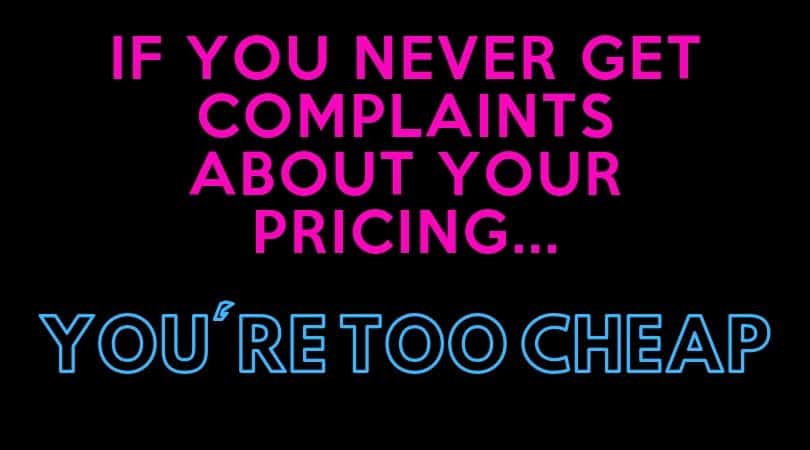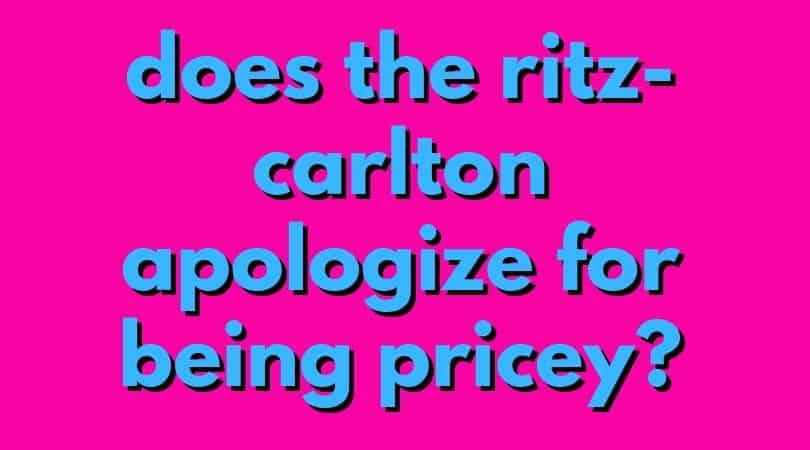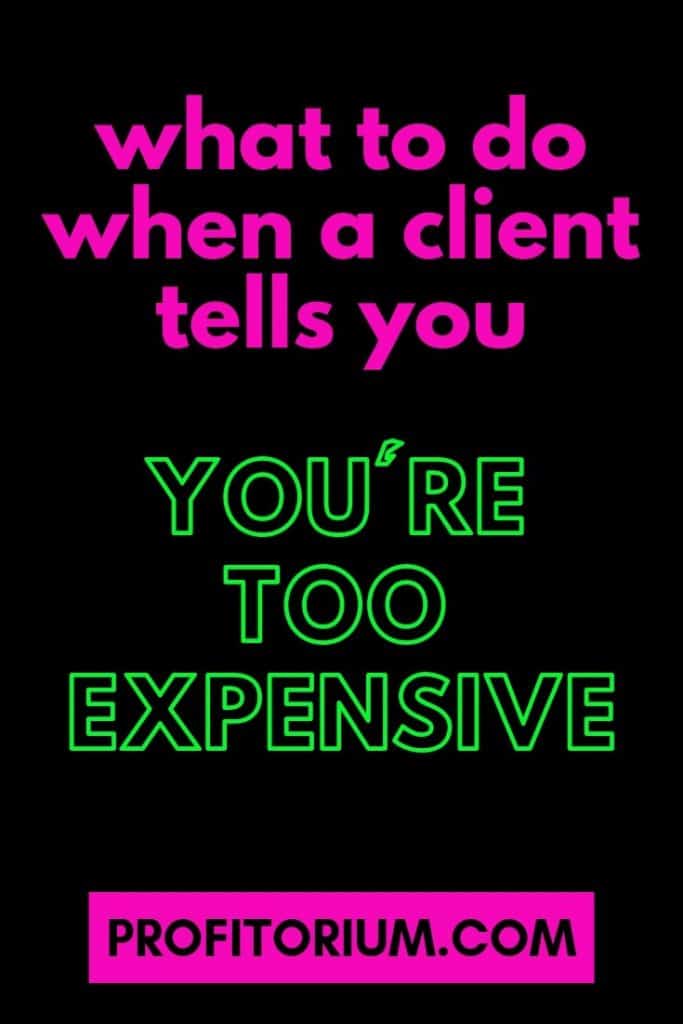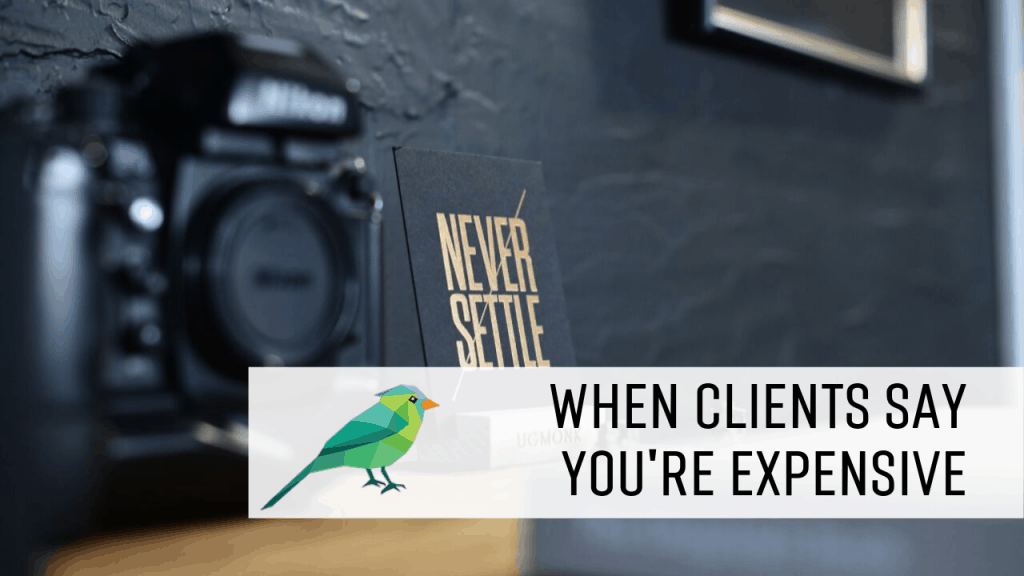We may earn money or products from the companies mentioned in this post.

I realize that’s an abrupt way to start a post, but it’s a hard truth many consultants never learn. I can go on and on about why you should charge more, how much more you should charge, and what your clients think of you when you don’t charge more (HINT: just because they say they want cheap rates doesn’t mean they actually want a cheap consultant) – none of that is the focus today, though.
Today, I want to focus on what you should do in that awkward moment when a client expresses dissatisfaction with your rates. It happens to all of us eventually, and if you’ve been doing this a while and it hasn’t happened to you…go back to the first line of this post and start over.

Table of Contents
Step One: Resist the urge to apologize for your rates.
I get the urge to apologize, I really do. A lot of us like to see people happy, and we hate uneasy situations where things suddenly turn uncomfortable and we’re all talking about money and it’s just so painfully awkward that we want to say, “Sorry, you’re right, who am I to think I should get paid that much? Of COURSE I’ll knock off 25%!”
NO! Just stop.
This isn’t personal – it’s business. It’s your job to charge what you’re worth, and it’s their job to see if they can talk you down and save themselves or their company a little money.
Step Two: Confidently Acknowledge Your Rates
If you’ve never watched the show Suits, you’re missing out on a great role model for confidence meeting competence. Check out a few episodes and pay attention to Donna. She may be “just a secretary”, but it doesn’t take long to see she’s the driving force behind her high-powered attorney boss, Harvey Spector. She’s good at what she does and she knows it. Channel her when you’re faced with a challenge to your rates.
Some Donna-worthy lines to try out:
- And I’m worth every penny…
- I am, for good reason.
- My rates aren’t cheap, but they pale in comparison to the money I’m going to help you make (or save).
- Talent doesn’t come cheap.
The key to making these lines work is saying them with confidence and backing them up with competence. In many cases, the rate discussion will end here. The client will laugh or otherwise acknowledge what you’ve said, and the conversation will move on.
Occasionally, you’ll get the dreaded, “Yeah but…” or some variation of that. Basically, they’re telling you they’re not sold on your value. That brings us to the optional third step…
Step Three: Show them the Value
It doesn’t matter WHAT you’re charging if you can’t convince the client you’ve got the insight and ability to get the job done. Ideally, this is something you do well before you get to money talk – but hey, pitching is not an exact science, and some people are harder to convince than others. Along with your branding, reputation, and the general vibe they get from you, there are a couple of really big ways you can show you’re worth what you’re charging.
Show them what you’ve done for other companies or projects.
If you’re new, consider doing some of your own test projects to help you build up evidence (I’ll do a post on this in the future and amend this post to link to it). If you’ve got some experience, gather up the best examples to help show the client you’ve got what it takes. The more hard numbers, the better.
If you’re like me and a lot of your clients require confidentiality about some or all of your work with them, share what you can and consider creating test projects that you own so you’ll have additional examples to share. If you have some incredibly happy clients whose data is very private, consider asking if they’d provide a testimonial or act as a reference instead of sharing data (and make sure you use that reference extremely sparingly). Most people do love to help, assuming you don’t take advantage of their kindness.
Show them what you can do for them.
If you’re coming up short on references and case studies, this section becomes especially important. If you want to justify your rates, the client needs to have a sense of what you want to do for them and how it will affect their bottom line. This is easier in some fields than others. For marketing, you can come up with specific monetary projections. For design and copy, you can talk about what would happen to their revenue if your work increases their conversion rate by 20%, or what kind of traffic and inbound link impact they could expect from search engine optimized blog posts.
You can’t always be terribly precise, but you can offer simulations, industry norms, or educated guesses. Just make sure you don’t go too crazy. It’s no good if you make promises you can’t keep.
Show them your passion.
Most of what people hire freelancers for is not rocket science. Very often, there will be several candidates who could do the job equally well. If nobody stands out, it may come down to price – but we don’t want that. If you’re competing on price, you lose either way.
What you DO want is to show them they’re not just another company in a long line of pitches (even if they technically are). During the entire pitching phase, you need to blow them away with your knowledge of their company and the competitive landscape. It doesn’t take much to make a big impact.
Express an interest and ask questions about both the company AND the individual you’re dealing with. Ask them how their widget compares to a (specific) competitor’s widget. Inquire about a product or program feature you noticed but didn’t quite understand. Find subtle ways to show them you’ve done your homework, and they’ll get it.
What you shouldn’t do is just gush about how much you love their company and you’d love to work with them, then fail to show it in any specific ways. You want to show, not tell.

Step Four: Be prepared to walk away.
Here’s a little secret – if you’ve really sold someone on what you’re offering, price is almost never the issue unless you’ve GRAVELY miscalculated the size of business and their ability to buy your services. If nearly every potential client tells you you’re too expensive, you’re fishing in the wrong pond.
Another little secret? Clients who force the price issue too much are almost never good clients. As much as I respect their bargaining game, I’ve always regretted allowing someone to bring my rates down. In virtually every case, I’ve ended up with a client who attempted to push me around in other ways – scope creep, unreasonable demands, micro management, and even changing terms are not uncommon with people who don’t respect your rates.
As a freelance consultant, you want to work with people who respect your time, money, and ability. If someone won’t pay what you’re asking, don’t waste your time doing all kinds of crazy number gymnastics to make it work. You may be able to adjust the project scope downward to make a deal that works for both of you, but be careful about letting the project get too small to be worthy of your time. You’ll be resentful, you won’t give it your best, and in the end, nobody will be happy.
There are hundreds of thousands of good-sized businesses in the US alone. You could spend your entire life pitching and never get to all of them (and there’d be new ones popping up the entire time). If you and a client can’t come to an agreement that pays you what you’re worth, let it go. There WILL be others, but you’ll miss them if you’re too busy doing work for peanuts.
Save it on Pinterest


